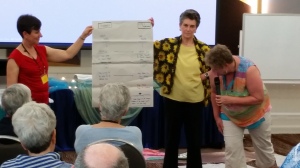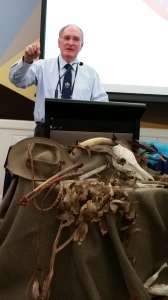On three of the morning sessions the conference was inspired by three guest speakers, who addressed the conference on a variety of topics related to pastoral care and supervision.
The first of these was the Rev Silke Moolmann. Silke was ordained in 1990 as a Pastor of the Lutheran Church of North Elbian, Germany. She served 25 years in South Africa, as a Hospital Chaplain in the USA and as a School Chaplain in Australia. During the years of huge political change in South Africa from Apartheid to a democratic government, she was tasked with establishing a joint presence of the Lutheran churches in the slums of Cape Town, identifying and responding to the needs of the poor before serving as a Parish Pastor for 10 years. CPE Studies were undertaken whilst in the USA.
Abstract of Silke’s presentation:
“Everyone lives in a context which impacts our understanding of ourselves, others and the world around us. Even though we may be aware of some aspects we would normally not question what is familiar to us. It changes dramatically if we are challenged by what is going on around us. The world seems to get more crazy by the day and what’s happening leaves it marks on people, evokes fear and the feeling of helplessness. You are invited to come along on a journey of discovery and discernment to name the known and to explore – through a biblical story – the unexpected challenges and the treasures you have been granted already.”
The second of the conference presenters was Bishop Bill Morrison. Bishop Morris was ordained a priest of the Archdiocese of Brisbane in 1969 and was appointed the fifth bishop to the vast Diocese of Toowoomba in 1993. He brought with him nearly twenty-five years of pastoral, administrative and leadership experience to his new See. His appointments, prior to Toowoomba included the parish of Surfers Paradise. During the years 1979 to 1984 he served as Secretary to Archbishop Francis Rush, in the Archdiocese of Brisbane, and also as Diocesan Director of Vocations. He is a member of the Royal Brisbane and Women’s Hospital Human Research Ethics Committee. He is involved in Seminars, Retreats and Formation programs as well as being invited to contribute to the production of a number of publications. In 2014 he published a book entitled, “Benedict, Me and Cardinals Three”. Over the years he has served on many Committees including: Chair, Australian Social Justice Commission; Chair, Bishops Commission for Justice, Development and Peace; Chair, Bishops Commission for Employment and Industrial Relations; Bishops Commission for Church Ministry, and Co-Chair, National Council for Professional Standards.
Abstract of Bishop Morris’ presentation:
“Deep within each of us is written our own song. But, if we remain on the ‘Water’s Edge’ we will never learn to breathe ‘Under Water’ and have the vulnerability to sing it with all our hearts. To be free to do so, we must be able to forgive both ourselves and those who have wounded us, for what is not transformed is transmitted. As we come together in these days of conference and actively listen to our hearts, hopefully we will discover the paradox of the Wounded Healer.”
Our final guest presenter was Neil Pembroke, Associate Professor of Practical Theology at the University of Queensland, Brisbane, Australia. Neil was awarded his PhD from Edinburgh University. He is a member of the international Academy of Practical Theology. Neil serves on the editorial boards of Pastoral Psychology and Practical Theology. An ordained minister of the Uniting Church in Australia, Neil is the author of six books and more than 40 articles on pastoral theology. He coordinates Masters and Doctoral programme in practical theology at the University of Queensland.
Abstract of Neil’s presentation:
“In this session, the intention is to show how philosopher Simone Weil’s notion of attention informs our understanding of deep listening. The first insight that we gain from Weil is that attention flows from desire and an experience of joy in being with another. The second connection that will be made is that attention requires the stance of waiting. The caregiver needs to listen with openness and expectancy. The final insight that is offered is that attention is founded on self-emptying. If the ego fills the interpersonal space, there is no room for the communications of the other. I turn to the thinking of Thomas Merton on the true and false selves to shape the discussion.”




